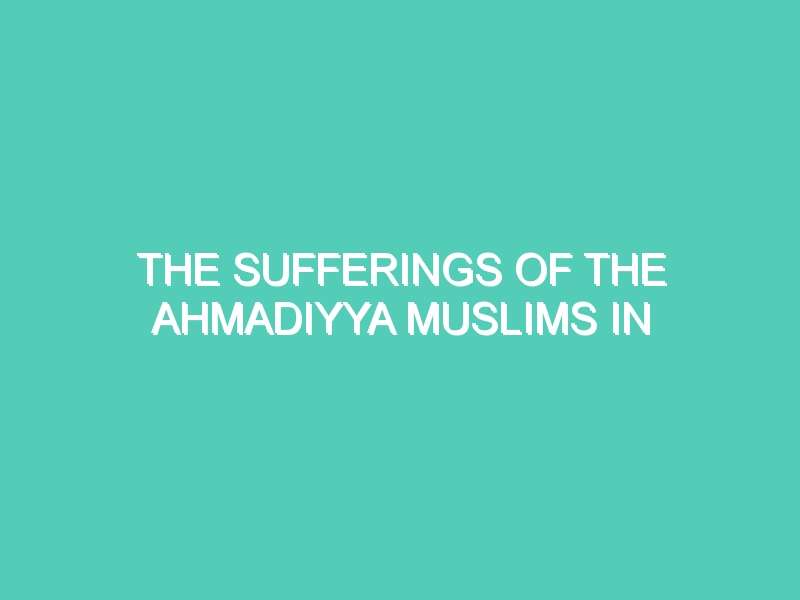According to the Minority Rights Group International, the minority population in Pakistan in 2002 accounted for 11-13 million with Ahmadis, Christians, and Hindus each accounting for 4 million[1].The statistics post that have been decreased and manipulated by the State released reports. The Ahmadiyya community have always considered to be a part of the large Muslim community and show no disrespect towards its religion, however the response is not the same from the Muslim majority who consider such community to be as outcastes and segregate them in every sector leading to mass sufferings and despair caused to such community. Most importantly, such acts of marginalization and persecution have been state-approved and sponsored which aid the majority to enforce the dominance over the Ahmadiyya’s and other religious communities. Passing laws and stating in its Constitution expressly regarding such communities to be treated as non-Muslims and criminalizing their religious and faith practices have led them to live in fear and humiliation. This article majorly focuses on the religious persecution being faced by the Ahmadiyya’s in Pakistan but also sheds a light on other communities who often become victims to the majority dominance and their object to achieve supremacy leaving them in a state of humiliation, despair and vagrancy.
THE EMERGENCE OF PERSECUTION
The Ahmadis population consists mostly of areas of Punjab and other provinces of Europe, especially UK. Since their non-recognition by the Pakistan State in the category of ‘Muslims’ and officially considering them as ‘Non-Muslims’, many of them have migrated from the countries fearing the religious persecution which was prevalent before such official announcement. They have diversified with their culture, language, and family;however, their roots take them back to Punjab[2]. The Ahmadiyya’s were founded by their so-called messiah or prophet in the form of Mirza Ghulam Ahmad in 1983. The Ahmadian’s claim that the teachings of Ghulam Ahmad were to propagate the laws enunciated by the Islam’s Prophet Mohammed[3]. The Ahmadiyya always believed that their founder being the prophet, his preaching and prophecy were never ended with the Prophet. This stark contrast in ideology is one of the primary reasons for the difference existing between the majority Muslims and the Ahmadiyya’s. The leaders of such communities were keen on getting their groups with a separate identity and wanted to liberalize their people from the shackles of the State order and policies. However, soon after Jinnah’s death, the next Prime Minister in order to establish religious conformity, tried to establish the principles across the nation. Moreover, it was all the efforts of the Pakistan’s first elected Prime Minister Zulfikar Ali Bhutto, which brought the amendment in the Constitution classifying such group to be non-Muslims in 1973[4]. Such actions led to mass violence all across the nation enforcing the martial law for the first time in Lahore[5]. In addition to thus, they also protested and brought riots to remove any form of representation from the Ahmadiyya’s committee in the structure of the government and ministers. Many socio-political leaders were arrested over their actions to introduce the differences within the Muslim community regarding the standard definition of Muslim. Furthermore, this has led to the Ahmadiyya’s hide their profession of religion due to the state policies being imposed.
With the Eights Constitutional Amendment in 1973, separate electorates were introduced for non-Muslims. Now, the electoral laws contain several discriminatory provisions that exclude the Ahmadian’s though being included in the category of non-Muslims. However, there were provisions for one to be listed as a Muslim voter for which a certificate of faith was to be signed and deny all the claims regarding the holy founder of Ahmadiyyat[6]. The Ahmadiyya’s to this very vehemently opposed as against their self-identity of being Muslims. This way, the Ahmadiyya’s were prevented from contesting and casting votes. This exclusion was exclusively highlighted by the European Union Election Observation Mission (EU EOM) stating that,
the situation of the Ahmadi [Ahmadiyya] community remains unchanged. They are still registered on a separate electoral roll, contrary to constitutional provisions on the equality of citizens and against international law.[7]
INSTANCES OF VIOLENCE &MISUSE OF THE BLASPHEMY LAWS BY THE STATE AUTHORITIES
The Ahmadiyya’s were facing religious persecution in their religious places of worship where they were eventually not allowed to enter any such places and totally segregated from the other Muslims. Moreover, the persecution towards them has led to an increase where statistics reveal that more than 500 Ahmadiyya’s were booked for offences of blasphemy in the name of preaching, offering prayers, distributing the periodicals etc[8]. They are subject to the common acts of threats, blackmailing, torture, target killings, gender-oriented attacks, and the hate campaigns organized by the various Islamic groups through the means of public means[9].Moreover, as per their Penal Law, they have quite expressly mentioned how such minority groups aren’t allowed to refer to their places of worship as mosques or even refer to their holy teachings of Quran. Such immoral laws making one deviate from following his/ her religion is certainly what the Muslims in majority have enforced upon which now the State is enacting and curbing such liberty of its citizens belonging to these communities specifically.
There have been instances where the graveyards have been attacked leading to cemeteries being desecrated, destruction of the graveyards of people including the Nobel Prize Winner Abdus Salam whose religion was defaced from the grave on the ground of him being a Ahmadiyya[10], denying burying the deceased in graveyards etc.[11] The persecution has increased to levels where now religious place of worship such as mosques are being stone pelted just to restrict the minority to enter into such places. Amidst all these persecutions, mankind has lost all its meaning where in order to segregate people, they have now encroached upon places of worship. The acts of these groups destroying a worship place in 2010 has led to mass-scale massacre leading to casualties of over 90 deaths[12]. In the recent years, there have been similar attacks on mosques in Sialkot in 2018 where a 100-year old mosque was destroyed[13].Such instances have been widely reported by the International Human Rights Committee on the issues of arbitrary arrests and detentions with subject to police brutality[14]. There have been incidents of common mob attacks on factories owned by Ahmadiyya’s in 2016 to acid attacks on people regularly to attacks on mosques[15]. The factories were set on fire employing about 200 people with a mob population of over 1200 people[16]. The response of the police authorities has been very ignorant on such attacks and even if any arrests are taken place, they release the accused’s often on bail. They fail to carry out their investigation procedures leading to an unfair trial and finally tampering and fabricating with the evidence leading to the release of the accused’s. In furtherance to this, false cases have been reported where the authorities support these actions leading to furthermore disadvantage and subject to abuse at the hands of the State. Incidents of extra-judicial killings are common which have not led to enquiry on officials and have been side-lined providing injustice to the community as well as mankind. The police even on prior intimation in regard to a mob attack fail to acknowledge any such protection resulting in mass violence and being typical examples of the dominance exercised by the majority on Ahmadiyya’s. This very clearly displays the hatred which the government has towards such communities and their response towards decreasing such persecution which has engulfed in the nation. It is the government’s failure to not prosecute people who were involved in such curtailments of rights and liberties promoting an environment of intolerance and acts of violence.According to the reports of South Asia Democratic Forum (SADF), “an accusation of blasphemy hardly ever results in legal process.”[17]
Furthermore, there has been various riders imposed resulting in curtailment of the Ahmadiyya’s rights and liberties.They are deprived of their basic needs and rights when arrested or detained leading to an unfair trial. It has been reported that such crimes committed on the Ahmadiyya’s have not been duly dealt with the judiciary system leading to global criticism by organizations[18]. As reported by the International Committee of Human Rights, there have been multiple cases and incidents regarding the confiscation of literature and unlawful raids leading to forced arrests making the community vulnerable to injuries and abuses.[19]
EFFECT ON SECTORS OF EMPLYMENT AND EDUCATION
In the sphere of employment, the Ahmadiyya’s have been subject to rejections despite qualifications and promotions being denied at regular intervals. Such practises and form of discrimination extend to public sphere of employment and at all levels where they are forced to undertake menial jobs despite having well education background and qualifications. The Ahmadiyya’s are known to possess high educational standards in the society, however in spite of their qualifications there have been multiple restrictions which have been imposed by the State. Moreover, such sectors have now enforced the nationalist ideology of Islam. This has led the people from Ahmadiyya community to rather not disclose their identity and faith in order to save themselves from the brutal abuse, discrimination, segregation, and the threats which people from these communities usually receive. The State has nationalized various institutions and taken over the operations of those which have ownership and management rights with members of the Ahmadiyya community with an offer to return such rights on certain conditions. The community members accepted the conditions, however the authorities refused to transfer the management and the rights back to such community[20]. Apart from restricting the number of the schools and other educational institutes being run and managed by the Ahmadiyya, they are not allowed to teach, or impart any kind of knowledge in such institutions. They have been victim of social boycott to such exclusion from entering into the spheres of education and employment. The students from these communities are taught with a curriculum which specifies the hatred and promotes such hatred and extremism towards these communities[21]. With respect to the economic persecution faced by the Ahmadiyya’s, it is not only limited to restrictions on entering into various public places such as shops and the boycott on any products endorsed or manufactured by them. They are also subject and vulnerable to physical acts of violence such as vandalising, ransacking, destruction of facilities owned and managed by the members of the Ahmadiyya community[22]. Such instances of violence have led to people to forcefully abandon their homes and places of business and migrate to another city to save themselves from such boycott and persecution.
PERSECUTION EXTENDING TO OTHER COMMUNITIES
Similar challenges have been faced by other religious minorities such as Hindus and Christians. Such communities have always remained vulnerable to such persecution under the blasphemy laws, though there exist no specific laws as with the case of Ahmadiyya’s. Gruesome acts of persecution has led to attacks of violence and mass-scale riots leading to burning of Christian bodies in 2009 and the incident of Rimsha Masih[23] where a young Pakistani Christian girl. was arrested on the grounds of ‘blasphemy’[24]. In fact, an interesting thing is that no representation is being allowed for such accused during her custody. Even the Human Rights Commission of Pakistan (HRCP) have confirmed to the situation of deterioration of Ahmadiyya’s[25]. Additionally, the International Human Rights Committee in its report on the situation have claimed the Ahmadiyya’s to be one of the most severe faced groups to the persecution where the intolerance toward such communities are increasing each day[26]. It is not only the religious community which has been a target by the majority in the recent times leading to social exclusion, discrimination and been victims of boycott in areas of education, workplace, government offices etc. The women within such community are faced with deeper troubles as they try to survive within the shackles of the patriarchy which prevails in Pakistan. In furtherance to the above treatment by the majority, they are subject to overt forms of discrimination in their day to day lives where, for an instance the shopkeepers ban them from entering the shops thereby infringing the basic human right of equal opportunity[27]. There have been numerous incidents leading them to complete social exclusion to avoid such abuse from other communities.
Even after the repeated recommendations by the Human Rights organizations to repeal such laws which are discriminatory towards the religious minorities, no such effect has been given till such date. The European Union has conclusively stated that such religious minorities have not yet attained their civil liberties and equal opportunities since the adoption of their Constitution. The inability of the State to deal with this situation and their complete neglect and ignorance on such persecution being shown towards the Ahmadiyya’s as being “entrenched into the fabric of Pakistani society.”[28]Non-ensuring of equal status within the communities as emphasized in the fundamental text through its policies has led to gross marginalization of the Ahmadiyya Muslims. Many have acquired the status of ‘refugees’ by the United Nations in countries such as Thailand, Sri Lanka etc. where the status of the camps harbouring such communities is even worse.[29]
CONCLUSION
Moreover, international responses to such persecution have gained attention to such heinous acts caused to the minorities in the name of ‘blasphemy’.However, very little has been done to actually turn the tables in favour of the various religious communities in Pakistan to uplift their position. The problem lies within the State itself which sponsors such persecution and allows for a free ingress on such marginalization. The State have often shown lack of will towards protecting to such community. This lack of will constitutes another example of marginalization by the authorities where they fail to prevent any attack or protect the victims of ongoing attacks. The civil and political rights constitute the core of the human rights as accepted at the international level. Such persecution in the society has led to the deprivation of the rights to provide equal and fair opportunities in societal and political life. It is only after the active involvement of the international agencies to end the dominance and supremacy in the country of Pakistan and even other countries where such persecution exists. It has to be a long path of success which require various goals to achieve but the most important is to abolish the curtailment which has been given to these Ahmadiyya’s such as right to freely profess, freedom to worship, freedom to vote, freedom to have an equal opportunity everywhere and stand on the same line as the majority. Even Reports have suggested the role of the international community which needs to pay a major part and exert its influence to ensure Pakistan complies with its international obligations to safeguard and protect its citizens[30]. There has been recognition as well as condemnations of the discriminations and persecutions happening in the country by various people from other countries such as U.S, U.K. etc. however in reality very less has been offered as solution to interfere with the State policy and mitigate the risks of such abuse.
Thus, to conclude it can be said that not only the Ahmadiyya’s have been subject to religious persecution in Pakistan, but other religious communities too i.e. Hindus, Christians etc. have been subject to persecution having effect on both the genders, though a large impact have been on women. The discrimination and marginalization faced by these communities have been from a long time where the State imposed and sponsored policies have led to the detriment of these communities forcing them to migrate as they cannot handle the brutal and state-approved persecution which encroaches upon their religion and other major fundamental rights as guaranteed to them in the Constitution. Such control and stringer regulationsare leading to a fractured and divided society with all the guaranteed rights and freedoms being violated and with no respite for such communities who become the ultimate victims to these attacks. It all comes down to how the various international agencies and organizations now takes steps observing the State’s reluctance to implement upon the recommendation by these agencies and organizations. Apart from this, the principles and state policies which needs to be re-evaluated with a stern voice from various organizations responsible for promoting global peace and who work for upliftment of the minorities to take concrete steps and actions to restructure the whole system in order to make changes in the society and make lives better for people in Pakistan.
Article Written By-Kushal Tekriwal
(HRDI Work From Home Internship)
[1]Minority Rights Group International, Dr. Iftikhar H. Malik, “Religious Minorites in Pakistan” 10 (September, 2002).
[2]Ibid.
[3]“Who are the Ahmadi?” BBC News, May 28, 2010.
[4]The Constitution (Second Amendment) Act, 1974, s. 3.
[5]Supra note 2 at 8.
[6]South Asia Democratic Forum, Siegfried O. Wolf, “Persecution against the Ahmadiyya Muslim Community in Pakistan: A multi-dimensional perspective” 6 (May, 2019).
[7]Ibid at 8.
[8]Supra note 2 at 26.
[9]Supra note 7 at 32.
[10]“Pain of Pakistan’s outcast Ahmadis” BBC News, September 30, 2014.
[11]Supra note 7 at 30.
[12]“Pakistan mosque attacks in Lahore kill scores” BBC News, May 29, 2010.
[13]Saad Sayeed, “Pakistani mob destroys 100-year-old minority Ahmadi mosque” Reuters, May 24, 2018.
[14]International Human Rights Committee, “Ahmadis in Pakistan face an Existential Threat: The growing Violence, Legal Discrimination and Social Exclusion Since 2015” 36 (2016-2017).
[15]Ibid.
[16]Supra note 15.
[17]Supra note 7 at 22.
[18]Supra note 15 at 38.
[19]Ibid.
[20]Supra note 7 at 26.
[21]Supra note 7 at 26-27.
[22]Supra note 7 at 28.
[23]“Girl accused of blasphemy ‘denied meeting with lawyer’”Dawn, August 23, 2012.
[24]Declan Walsh & Salman Masood, “Christian Girl’s Blasphemy Arrest Incites a Furor in Pakistan”The New York Times, August 20, 2012.
[25]Supra note 15 at 34.
[26]Ibid.
[27]Supra note 15 at 43.
[28]Supra note 15 at 50.
[29]Supra note 15 at 51.
[30]Supra note 15 at 52.



